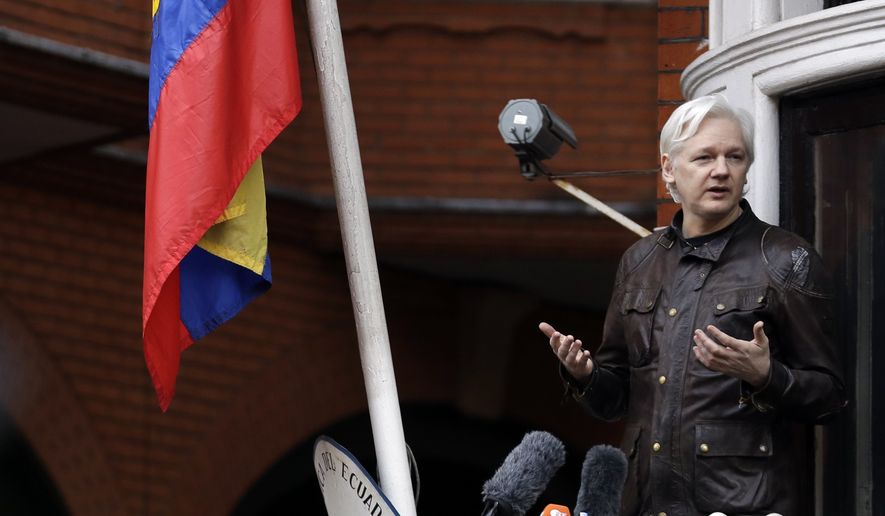A Virginia federal court judge heard competing arguments Tuesday morning for and against disclosing details about the government’s investigation into WikiLeaks publisher Julian Assange.
In Alexandria, Lawyers for the Reporters Committee for Freedom of the Press, a non-profit organization representing journalists’ interests, asked U.S. District Judge Leonie M. Brinkema to issue an order unsealing court records concerning the government’s likely case against Mr. Assange, an Australian native responsible for releasing classified government material through his WikiLeaks website dating back to 2010.
Judge Brinkema, a Clinton appointee, concluded the hearing without issuing a ruling, instead asking the Reporters Committee to file supplemental material and asked the Justice Department to enter its response within the following week.
“This is an interesting case, to say the least,” the judge said at the start of the hearing.
A spokesperson for the Justice Department declined to comment afterward on the hearing’s outcome, and representatives for WikiLeaks did not immediately return messages seeking comment.
“It appears the court is giving the unsealing request careful consideration,” Reporters Committee lawyer Caitlin Vogus told The Washington Times.
Attorneys for the Reporters Committee asked the court to publicly disclose its case against the 46-year-old WikiLeaks publisher after a recent filing in an unrelated matter suggested that Mr. Assange has been secretly charged by U.S. prosecutors.
The Justice Department said the filing was an inadvertent error, and that the government can neither publicly confirm nor deny the existence of any charges into Mr. Assange, let alone unseal any applicable case dockets as requested.
Either Mr. Assange has been charged under seal, or he has not been charged at all, Assistant U.S. Attorney Gordon Kromber said in court Tuesday.
“We made a mistake,” Mr. Kromber told the court. “The only thing you can conclude from our mistake is that we made a mistake.”
WikiLeaks has been the subject of a longstanding government investigation, but the Justice Department has not officially acknowledged the existence of any probe involving Mr. Assange in a personal capacity, Mr. Kromber added
Eight years since WikiLeaks began releasing classified U.S documents, Reporters Committee lawyer KatieLynn Townsend said Mr. Assange “at a minimum” knows he has been criminally charged by U.S. prosecutors, however. Members of the Trump administration have publicly confirmed discussing the situation surround Mr. Assange as recently as June 2018, and multiple outlets reported earlier this month that the Justice Department has secretly filed unspecified charges against him.
Mr. Kromber argued that a public courtroom was not an appropriate venue to discuss any possible criminal proceedings against Mr. Assange, and that previous news reporting suggesting he has been charged is “speculation.”
Whether inadvertent or not, the filing mentioning charges against Mr. Assange “confirms” the speculation, Ms. Townsend argued.
Any decision on the group’s request to unseal likely against Mr. Assange must balance the government’s legitimate interest against the public’s right to know, the judge said during the ruling.
Until a defendant is arrested, the government has a compelling interest in keeping the case against them sealed, the judge added. Prematurely alerting the defendant could allow them to flee, destroy evidence or disrupt efforts to issue their arrest, she told the court.
Judge Brinkema concluded the hearing by asking the Reporters Committee to file supplemental material that would support their case for having the court order the unsealing of any proceedings involving Mr. Assange. The Justice Department will have a week to respond.
The Reporters Committee plans to supplement its briefing by Dec. 4, Ms. Vogus told The Times.
The Justice Department admitted investigating WikiLeaks in 2010 after the website published classified U.S. diplomatic and military documents. More recently, the website published internal Democratic National Committee emails and classified CIA hacking tools in 2016 and 2017, respectively,
Mr. Assange entered the Ecuadorian Embassy in London in 2012 seeking protection from possible U.S. charges. He was subsequently granted asylum and citizenship, but the lingering threat of being arrested upon exiting and extradited abroad has prevented him from leaving the facility in the six years since entered.
• Andrew Blake can be reached at ablake@washingtontimes.com.




Please read our comment policy before commenting.